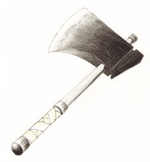ふくむすめどうわしゅう(Hukumusume fairy tale collection) > がいこくご(Foreign language)
>イソップどうわ(Aesop’s Fables)

たびびと と オノ
The two travelers and the axe
(イソップどうわ)
(Aesop’s Fables)
ほんやく(Translation) ちいさな翻訳屋さん
| ♪にほんごのろうどく(Reading in Japanese) |
♪えいごのろうどく(Reading in English) |
||||
|
|
にほんご(Japanese) ←→ にほんご(Japanese) & えいご(English) ←→ えいご(English)
ふたり の おとこ が、いっしょ に たび を していました。
Two men were travelling together.
そのうち、ひとり が みち に おちている オノ を ひろいました。
One of them picked up an axe on a path.
それ を みて、もう ひとり が、
The other one looked at him and said,
「ぼくたち は、オノ を ひろった」
“We just found an axe,
と、いいました。
didn’t we?”
すると、ひろった おとこ が いいました。
“No, it has to be ‘You’, ” replied the man picked up an axe,
「『ぼくたち は、ひろった』では なくて、『きみ は ひろった』と、いえよ」
“not ‘We’.”
しばらく する と、その オノ を おとした おとこ が ふたり を おいかけて きました。
After a while, a man who had dropped the axe came after them.
その おとこ は とうぞく で、ぬすんだ オノ を おとして しまったのです。
He was a thief and stole the axe.
「ああ、もう だめ だ。ぼくたち が オノ を よこどり した と おもって いる。ぼくたち は もう たすからない」
“This is so helpless! He must be thinking that we took the axe. We are not going to make it,”
オノ を ひろった おとこ が なげく と、もう ひとり の おとこ が いいました。
cried the man with an axe.
「『ぼくたち は たすからない』じゃなくて、『ぼく は たすからない』と いえよ。
“No, it has to be ‘I’, not ‘We’,” replied the other man,
だって、さっき オノ を ひろった とき に、きみ は ぼく を なかま に いれなかったん だから」
“You didn’t count me in when you found the axe, did you?”
よいこと が あった とき に、ともだち を のけもの に する ひと は、ふこうな め に あった とき に、その ともだち に たすけて もらえる はずがない。
The one who doesn’t share his luck with his friend won’t deserve to be saved when in danger.
と、いうこと を、この おはなし は おしえています。
That’s the moral of Click here to read a story.
おしまい
The end
| 福娘のサイト |
| 366日への旅 毎日の記念日・誕生花 ・有名人の誕生日と性格判断 |
| Hukumusume fairy tale collection 世界と日本の童話と昔話 |
| 子どもの病気相談所 病気検索と対応方法、症状から検索するWEB問診 |
| 世界60秒巡り 国旗国歌や世界遺産など、世界の国々の豆知識 |



